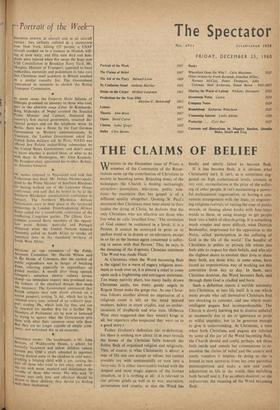THE CLAIMS OF BELIEF
WBITING in the December issue of Prism, a member of the Community of the Resur- rection sums up the contribution of Christians to society in haunting terms. Rejecting many of the techniques the Church is finding increasingly attractive—journalism, television, public rela- tionS—ho maintains that her gospel is of a different quality altogether. Quoting St. Paul's statement that Christians must bear about in their bodies the dying of Christ, he declares that the only Christians who are effective are those who live what he calls 'crucified lives.' The revelation
of God cannot be contained in a book; it is a Person. It cannot be conveyed in print or in spoken word or in drama or on television, except in so far as the human agent concerned is suffer- ing in union with that Person.' This, he says, is the meaning of the dogmatic Christian statement `The Word was made Flesh.'
At Christmas when the Word becoming flesh is the signal for a wave of sugary religious senti- ment to wash over us, it is almost a relief to come upon such a frightening and astringent statement. Too many nativity plays, too many badly drawn Christmas cards, too many. gaudy angels in Regent Street make the gorge rise. As one Christ- mas follows another almost no impression of a religious event is left on the mind beyond mothers, babies in straw cradles, and an embar- rassment of shepherds and wise men. (Rebecca West once suggested that they weren't kings at all, but reporters who suspected they were on to a good story.)
Father Graham's definition (or re-definition, for there is nothing new about it) at once reveals the bones of the Christian faith beneath the flabby flesh of organised religion and religiosity.
This, of course, is what Christianity is about; a way of life one can accept or refuse, but cannot possibly toy with sentimentally or turn into a
fairy-tale. It is either inextricably locked with the
deepest and most tragic aspects of the human situation, or it is nothing at all: it is relevant to our private griefs as well as to war, starvation, persecution and cruelty, or else the Word has finally and utterly failed to become flesh. If it has become flesh, it is obvious what Christianity isn't. It isn't, as is sometimes sug- gested on high ecclesiastical levels, cosiness at any cost, reconciliation at the price of the suffer- ing of other people. It isn't maintaining a power- ful ecclesiastical organisation, or having a con- venient arrangement with the State, or engineer- ing religious revivals, or raising the tone of public morals, or fussing about books with four-letter words in them, or using strategy to get people back into a habit of church-going. it is something much simpler and more difficult, what Dietrich Bonhoeffer, imprisoned for his opposition to the Nazis, called 'participation in the suffering of God in the life of the world.' The handful of Christians in public or private life whom one feels able to respect for their beliefs, and who stir the slightest desire to emulate their lives or share their faith, are those who, in some sense, have found an unpretentious way of working out this conviction from day to day. In them, says Christian doctrine, the Word becomes flesh, and through them God is cradled and born.
Such a definition injects a terrible solemnity into Christmas, as into life itself. It is one which many people who call themselves Christians find too shocking to consider, and one which many 'intelligent pagans find incomprehensible. The Church is slowly learning not to dismiss unbelief as necessarily due to sin or ignorance or pride or wilful stupidity, but to be generous enough to give it understanding. At Christmas, a time when both Christians and pagans are infected by some of the joy of the Word becoming flesh, the Church should and could, perhaps, ask those both inside and outside her communions to re- examine the claims of belief and the austere and costly vocation it implies. In doing so she is bound to turn outwards from her own parochial preoccupations and make a new and costly adjustment to life in the world, thus enriching
both herself and it. For as others discover, so she rediscovers, the meaning of the Word becoming flesh.


























 Previous page
Previous page